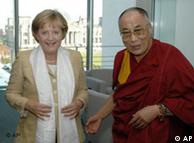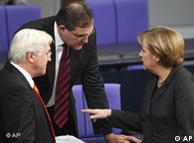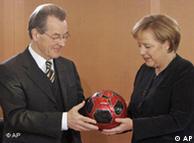Politics | 22.11.2007 /d.welle
Merkel's Government Shows the Strain at Halfway Mark
Nov. 22 marks the two-year anniversary of Chancellor Angela Merkel's arrival in office. Amid simmering tensions in Berlin, freshly minted Vice Chancellor Frank-Walter Steinmeier wants greater unity within the coalition.
When Social Democrat Franz Müntefering resigned as vice chancellor last week in order to look after his cancer-stricken wife, the cracks in Berlin's balance of power became more visible than ever.
As the grand coalition's unofficial arbitrator, his departure dealt a serious blow to the government. Coming exactly two years into term, the move is likely to usher in a second half marked by widespread disharmony between the Christian Democrats (CDU) and their Social Democratic partners.
But Müntefering's successor, who is also Germany's foreign minister, is keen to play down the differences.
"The government cannot afford to be locked in a permanent election battle in the two years until the next vote," said Steinmeier on public broadcaster ZDF, the same day he was officially appointed to fill the shoes of Franz Müntefering as vice chancellor.
He would be aiming to make the coalition "more unified," he added.
Getting tough
 Bildunterschrift: Großansicht des Bildes mit der Bildunterschrift: A meeting with repercussions
Bildunterschrift: Großansicht des Bildes mit der Bildunterschrift: A meeting with repercussions
Disagreement is rife on a range of issues, from foreign policy to a minimum wage and tougher security laws, and Steinmeier is expected to be a more critical force than Müntefering.
In recent weeks, he has indicated disapproval of Merkel's foreign policy, especially in relations with Russia and China -- intimating that he regretted the effect Merkel's meeting with the Dalai Lama in Berlin in late September has had on relations with Beijing, such as a series of cancelled bilateral talks.
"As chancellor, I decide myself whom I receive and where," Merkel retaliated in the mass circulation newspaper Bild. "I would like everyone in the government to take this position, because otherwise China's respect for us certainly will not become greater."
Speaking on ZDF Wednesday, Nov. 21, Steinmeier was keen to mitigate his earlier approach.
"Basically, the issues we disagree on at the moment can be boiled down to a question of striking the right tone when it comes to human rights," he explained
Public support, party tension
Public opinion on the chancellor has been transformed since Merkel assumed office in 2005 after an inconclusive election. Although she was initially given a lukewarm reception, polls now show she is Germany's most popular politician.
Under her leadership, the country experienced an economic upswing, with unemployment down and the budget deficit reduced. On the international stage, she has championed environmental awareness and revived Berlin's friendship with Washington.
But within her coalition she has failed to flesh out a common agenda with the Social Democrats. And while Müntefering was able to tide the partners over, their differences can no longer be ignored.
These are acute, according to Guido Westerwelle, leader of the opposition FDP.
"They're all lovey-dovey for the cameras, but as soon as they're away from the flashbulbs they're banging their heads together," he said on private broadcaster N24 Wednesday night.
Change inevitable
 Bildunterschrift: Großansicht des Bildes mit der Bildunterschrift: Putting their heads together
Bildunterschrift: Großansicht des Bildes mit der Bildunterschrift: Putting their heads together
With the government reshuffled to adapt to the absence of Müntefering, the next two years will most certainly see Berlin undergo a major identity change.
Adding to the edgy atmosphere are suggestions that Merkel is unlikely to warm to Steinmeier as vice chancellor because he has been tipped as a potential candidate for the chancellorship at a later date. Strained relations will be tricky, given that his role requires him to coordinate government policy with Merkel.
But although the specter of early elections has already been raised, most experts agree that neither partner will risk bringing down the coalition before 2009, when Germany's next election is due.
"Anyone who chooses early elections will be punished by voters," the CDU's parliamentary leader Volker Kauder has said.
Asked on Wednesday what he thought the coalition could do to stabilize itself, the former vice chancellor was visibly relieved to pass the buck. "No idea," Müntefering responded.

Comments